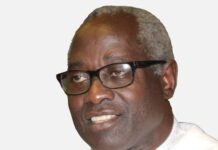ARE WE YET SUCCEEDING IN CHANGING THE GAMBIA?
by: Amadou Jallow
The word ‘change’ is today largely use by some of the world’s fast growing nations, technocrats and citizens as a tool to establish new reforms and strategies that adequately respond to the development needs of their people. It is few of the most constant dynamics we must embrace to allow nations and people to thrive and make pathways to adjust to the realities of time. However, change is one of the most feared processes globally for its eminent potential.
I think — and I do not intend to offend anyone — that Gambians are still caught between rough political separation and country interest and have not yet fully decided on the path to change and recovery, even after booting out the megalomaniac administration of the Jammeh leadership some five years ago. Without a doubt, however, it is true that change — everywhere, comes in diverse paths and features but to qualify each as a game changer, it must be able to make positive impacts on the lives and behavior of the people.
I infer this statement from the increase in political antipathy behavior and attitude of many Gambians and some civil service resistance to change behavior towards work. This is bitterly compromising the reforms process in the country. Gambia’s democracy is going through a hard test with increased need for mental education and awareness. The right opportunity has present itself and “Now” is the time to either grab it and place our country on the path to recovery of the lost glories or drag it back to stone-age.
Even though that we can now pride ourselves of restoring some element of democracy and freedom of expression, there still remains potential gaps to fill-up and majority of it has to directly come from the subjects themselves and not just the authorities in high positions. Change in itself presides within and must come from within to keep the ball rolling.
We must address one thing after the other, focusing on the prime issues that lead to the other. Let’s forget about the politics for now. Take our public institutions for instance, how professional, honest and serious are they operating when some of them are turned into market places where staff will be engaged in business activities. These things do not strengthen us; they only knock down the effectiveness of our institutions.
But the power that Gambians applied to install leaders in to positions can be the same power we can use to remove them if they are not guiding us to the right path to recovery. There is need to hire competent institutional authorities who — without fear or favour; affection or ill will — can effectively and professional lead our affairs. It is impossible for us to realize the change that we want when civil servants in both high and lower ranks arrive to work at 10am and close by 3:00pm and blame it on flimsy excuses like difficulty in accessing transport. Do we expect to see any positive change anytime soon when we shift blames and fail to observe our individual inner behaviors toward national duty?
Now, the immediate focus and direction must be driven by the peoples’ taste to establish drastic reforms by supporting and holding decision makers accountable for their actions which can allow us to restore the lost glories that the country once earned and not on waging political resentments toward one another.
Looking from the perspective of the world economic order, for instance — which is being shaped by a few dominant economies of which The Gambia is far from been close to, our acts must always correspond with the idea articulated in the declaration in the national anthem more than fifty years ago that ‘justice guide our actions towards the common good and that all may live in unity, freedom and peace each day.’ These declarations teach us about honest and unity and how Gambians should come together and walk towards the common good for all.
Today, citizens are facing rising price in basic commodities, dilapidated and unregulated transportation system, increased joblessness and criminal activities, and the seemingly unending difficulty in accessing clean drinking water in most parts of the rural communities and some misplaced priorities by the government— these are only retarding the country’s development leading to increased poverty. Only sober engagements and suggestions will give the authorities the focus to address these challenging issues.
For many Gambians, a new hope was born following their 2016 decision to vote out former President Yahya Jammeh’s 22-year autocratic rule. This was part of a movement around the world in which millions of people were then rising up against poverty— to which they were subjected to, against the domination of tyrants and against the submission of their countries to the policies of the big powers. But five years on and still counting, our education system remains depleting while maternal and child mortality continue to increase with little or no drugs and equipment available in our health facilities to treat people.
Now, one of the Barrow administration’s first acts in office must focus on empowering the National Council for Civic Education (NCCE) to enable that institution to educate the citizens on civic right and responsibilities, which will help in changing the mindsets from impeding political domination towards economic and social recovery. The government and the entire Gambian population should take cognizance of the country’s potential and the extraordinary future that awaits it, with its over 2 million inhabitants and its immensely rich land, which could allow the country to first of all achieve its independence in food production. Gambians must now disregard their devotion and sentimental attachments to politics and focus on shaping an economic reform for which the nation has been stagnant at one point for years.
For far too long, Gambia has been considered as one of the poorest and under-developed countries in the globe, but those who have given us lessons on how to manage our economies, have not themselves been able to escape the crisis born at the center of capitalism.
I clearly present myself as a defender of economic liberalism. I am not in agreement with some of the political resentments and attacks on one another; even if I may share with majority of Gambians the idea of reforming the country, which I acknowledge is in need of such. But we require more reasonable ideas and self-examination to help our leaders at the helm of affairs to have a sense of direction than only steamrolling criticisms without innovative suggestions.
Let the spirit of unionism embellish and peoples’ awareness reignite to understand that we must be one another’s brother and sister’s keeper. Our government and institutions must educate the population to create a mentality of righteous engagements in movements that will exonerate our people from debris to economic reform. This is nobler than some unmatched thought and perceptions that is now saturating the entire country.
I am a rational supporter of the free market economy and not the state-run economy which has failed everywhere or near it.
As we have now unshackle ourselves from a cage censorship of vicious authoritative realm, every sober Gambian should now support noble ideas and remind ourselves on the right approach, then our country would be on the path of economic and social transformation. Since the sending in parking of Jammeh government in December, 2016 to date, I have been following comments on the streets, on newspapers, radios and the social media and I still excused my frankness and ask myself and every Gambian the question: Are we yet succeeding in changing The Gambia?
Amadou Jallow is a Journalist, Youth and Children Empowerment and Community Development Advocate.
Email: [email protected]





















